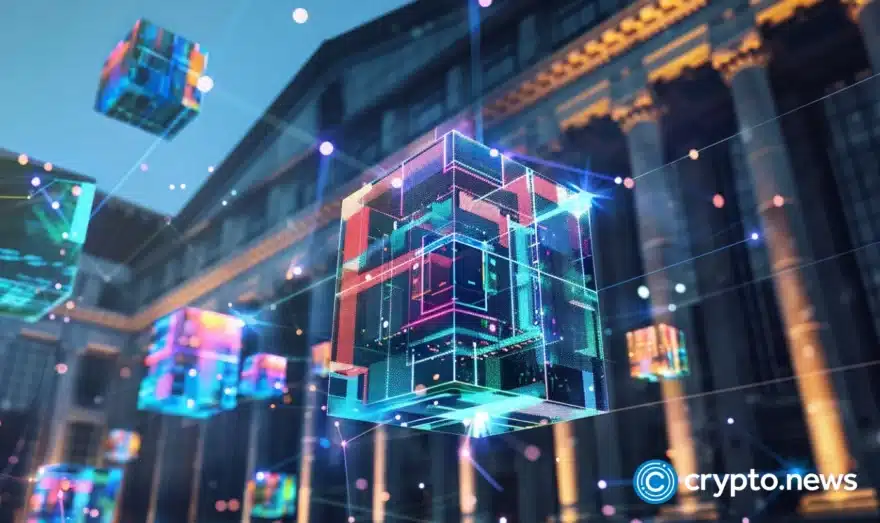Application-specific blockchains are the future of decentralization | Opinion

Disclosure: The views and opinions expressed here belong solely to the author and do not represent the views and opinions of crypto.news’ editorial.
Blockchain is a cutting-edge technology in today’s digital world. It secures online ledgers for cryptocurrencies like Bitcoin (BTC) and Ethereum (ETH) across industries. Its global market is projected to soar from $5.88 billion in 2021 to $1,314.03 billion by 2030 at an 82.4% compound annual growth rate (CAGR).
Enter application-specific blockchains. These platforms excel in performance, scalability, security, cost-efficiency, and governance compared to general-purpose applications, shaping the future of decentralization. As this industry segment expands, these specialized blockchains hold immense promise.
This page explores the impact of application-specific blockchains. Read on to find out why they are the future of decentralization.
Top reasons why it is the application-specific blockchains
Application-specific blockchains are the type of blockchains designed to operate a single application instead of building an app from an existing blockchain. They are new platforms created from the ground up with distinctive attributes, such as custom virtual machines and consensus processes. In short, they aren’t codes written on a general-purpose blockchain platform.
Evidently, application-specific blockchains are designed for individual decentralized applications (dApps). DApps are software programs running on a blockchain or peer-to-peer network of computers instead of on a single computer.
There are two types of blockchains you can distinguish: layer-1 (L1 coordinating consensus and execution on the same layer) and layer-2 (L2 separating execution from consensus). Avalanche Subnets, Polygon Supernets, and Cosmos Zones are a few examples of how you can utilize these customized blockchains to advance decentralization.
What’s great is that the blockchain industry has a long history of internal support among industry players and key developers. These internal blockchain investments provide talented developers with key opportunities to create application-specific platforms. They can seek blockchain funding in various practical ways, whether through bootstrapping, venture capital, or crowdfunding.
Application-specific blockchains can be instrumental to more decentralized networks. Here’s why they are the future of decentralization:
1. They allow for platform customization and optimization
As web3 technologies become more widespread, application-specific blockchains enable developers to customize blockchain characteristics for specific use cases. This customization is particularly beneficial for business applications. Companies might have specialized chain needs with particular attributes that these platforms can help optimize.
For example, Re.al has launched blockchain platforms for real-world assets (RWAs). They address long-term challenges in decentralized finance by providing a tailored solution for managing assets like properties and commodities. By developing its own blockchain platform, Re.al improves infrastructure, making assets more accessible for trading while maintaining fluidity and compatibility.
2. They enable you to scale applications up and down
Application-specific blockchains allow flexible scalability for platforms, allowing them to adjust capacity in response to demand. For example, EY’s Ethereum-based blockchain solution, the EY OpsChain Contract Manager (OCM), simplifies complex agreements, reduces costs, and improves security.
Application-specific blockchains differ from smart contracts, self-executing codes written on general-purpose blockchains. Smart contracts automate and enforce agreements between parties without changing the blockchains’ attributes. However, a smart contract audit process is critical for reviewing codes to detect and correct security flaws or problems.
According to Grand View Research, the global smart contracts market will grow from $684.3 million in 2022 to $73,773.0 million at an 82.2% CAGR. While this market growth could pave the way for future scalability in blockchain technology, the application-specific blockchain can offer more.
3. They guarantee network security and data privacy on the platform
Application-specific blockchains promote network security and data privacy. Thanks to artificial intelligence (AI) and blockchain integration, they are capable of securing networks and safeguarding information. While AI provides sophisticated data processing capabilities, blockchain maintains data integrity and transparency via a secure, decentralized ledger.
In logistics and supply chain management, protecting AI information on a blockchain provides data validity and accuracy across the supply chain. This eliminates tampering while also ensuring compliance and traceability.
The same technology applies to the media and entertainment industries. Decentralized AI networks on blockchain allow producers and consumers to communicate directly for guaranteed privacy and security.
4. They offer low transactional fees without compromising efficiency
Application-specific blockchains provide economic benefits by lowering transaction fees while maintaining efficiency. They also reduce costs by eliminating extraneous features and focusing resources on critical functions.
In web3, validators on platforms like ETC receive a significant percentage of the transaction fees and revenue generated by interactions with defi apps. However, defi apps on native chains can keep 100% of protocol costs, allowing them to extract greater value from their activities.
Further, application-specific blockchains allow applications to match token pricing to the underlying blockchain’s token value. For example, if an app chain asks users to pay transaction fees in the application’s token, its market value will increase. This business model benefits the application and its user base, establishing a symbiotic relationship.
5. They let you gain full governance and control of the application
In contrast to decentralized apps on general-purpose blockchains, application-specific blockchains provide full governance and control over infrastructure. They enable stakeholders to manage their own chain compared to shared blockchains from a broader, separate community.
Single-application blockchains align the interests of both the protocol and the application. They make it easier to adopt beneficial improvements tailored to specific needs, such as solving common problems with Apple screen time.
In industries such as automotive, blockchain securely logs sensor and operational data for AI-driven performance improvements. Blockchain’s openness assures audit records and adherence to safety rules, increasing accountability for AI decisions.
To the bright, decentralized future
Blockchain technology undeniably shapes the future of decentralization, especially through application-specific blockchain platforms that promote decentralized networks. These platforms offer potential benefits, such as:
- Customization and optimization
- Flexibility and scalability
- Privacy and security
- Cost-efficiency
- Governance and control
Whether you’re a developer, entrepreneur, or consumer, capitalizing on blockchain technology is essential. Utilizing application-specific applications can significantly impact your transactions. The ongoing technological progress and development in this field will further drive innovation, leading to more decentralized networks.
Application-specific blockchains are the future of decentralization—and we’ve only just begun!








